Contemporary Accounting Theory: CSR and Sustainability Report Analysis
VerifiedAdded on 2022/10/06
|20
|4273
|14
Report
AI Summary
This report provides a comprehensive analysis of Corporate Social Responsibility (CSR) and sustainability reporting, focusing on the Abacus Property Group. It begins with an executive summary highlighting the importance of sustainable development and the significance of CSR in achieving financial objectives. Part A delves into the importance of CSR, the holistic view of sustainability reporting, and the analysis of theories like stakeholder theory and legitimacy theory that explain the requirements of sustainable reporting. Part B introduces the Abacus Property Group, providing an overview of its history, ownership, governance, and financial performance. The report also includes a sustainable reporting scoring index based on the Global Reporting Initiative (GRI) guidelines and compares it with the company's sustainability report. The conclusion summarizes the key findings, emphasizing the crucial role of CSR and sustainability reporting in modern business practices. The report covers key aspects of CSR, sustainability reports, and how companies can align their activities with social and environmental aspects to achieve financial objectives. The analysis also covers the application of theoretical knowledge to explain reporting practices, with a detailed overview of the company and its CSR policies.
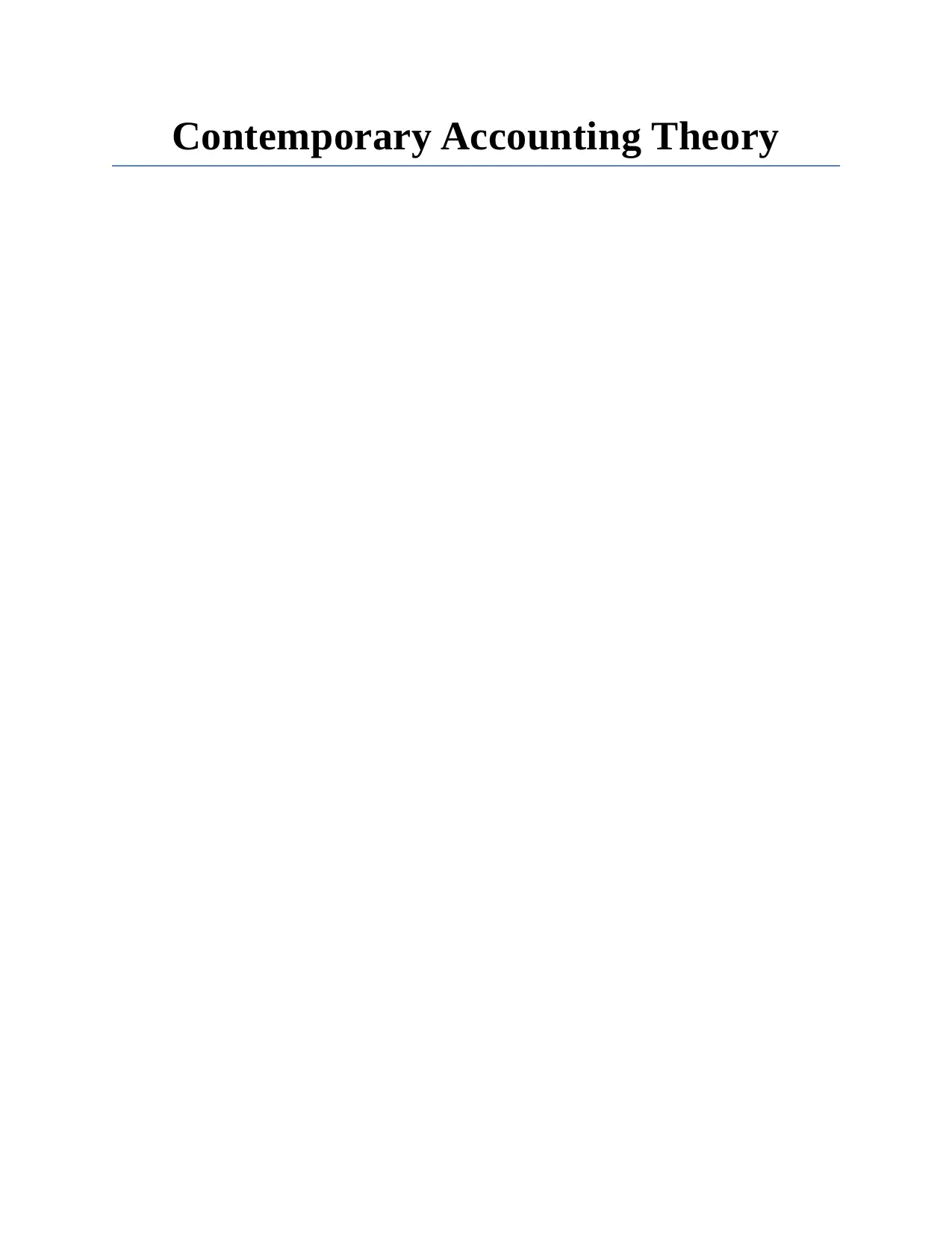
Contemporary Accounting Theory
Paraphrase This Document
Need a fresh take? Get an instant paraphrase of this document with our AI Paraphraser
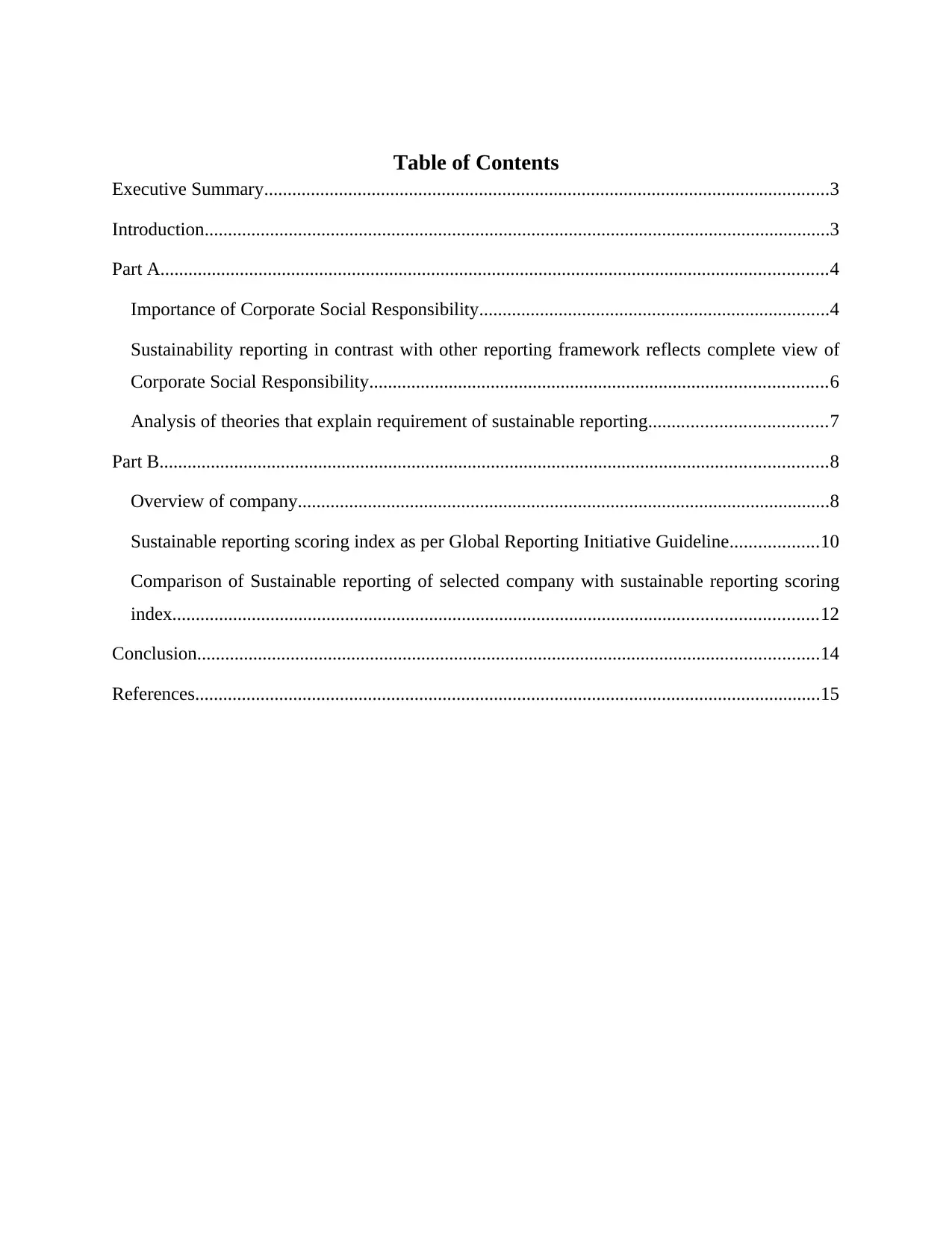
Table of Contents
Executive Summary.........................................................................................................................3
Introduction......................................................................................................................................3
Part A...............................................................................................................................................4
Importance of Corporate Social Responsibility...........................................................................4
Sustainability reporting in contrast with other reporting framework reflects complete view of
Corporate Social Responsibility..................................................................................................6
Analysis of theories that explain requirement of sustainable reporting......................................7
Part B...............................................................................................................................................8
Overview of company..................................................................................................................8
Sustainable reporting scoring index as per Global Reporting Initiative Guideline...................10
Comparison of Sustainable reporting of selected company with sustainable reporting scoring
index..........................................................................................................................................12
Conclusion.....................................................................................................................................14
References......................................................................................................................................15
Executive Summary.........................................................................................................................3
Introduction......................................................................................................................................3
Part A...............................................................................................................................................4
Importance of Corporate Social Responsibility...........................................................................4
Sustainability reporting in contrast with other reporting framework reflects complete view of
Corporate Social Responsibility..................................................................................................6
Analysis of theories that explain requirement of sustainable reporting......................................7
Part B...............................................................................................................................................8
Overview of company..................................................................................................................8
Sustainable reporting scoring index as per Global Reporting Initiative Guideline...................10
Comparison of Sustainable reporting of selected company with sustainable reporting scoring
index..........................................................................................................................................12
Conclusion.....................................................................................................................................14
References......................................................................................................................................15
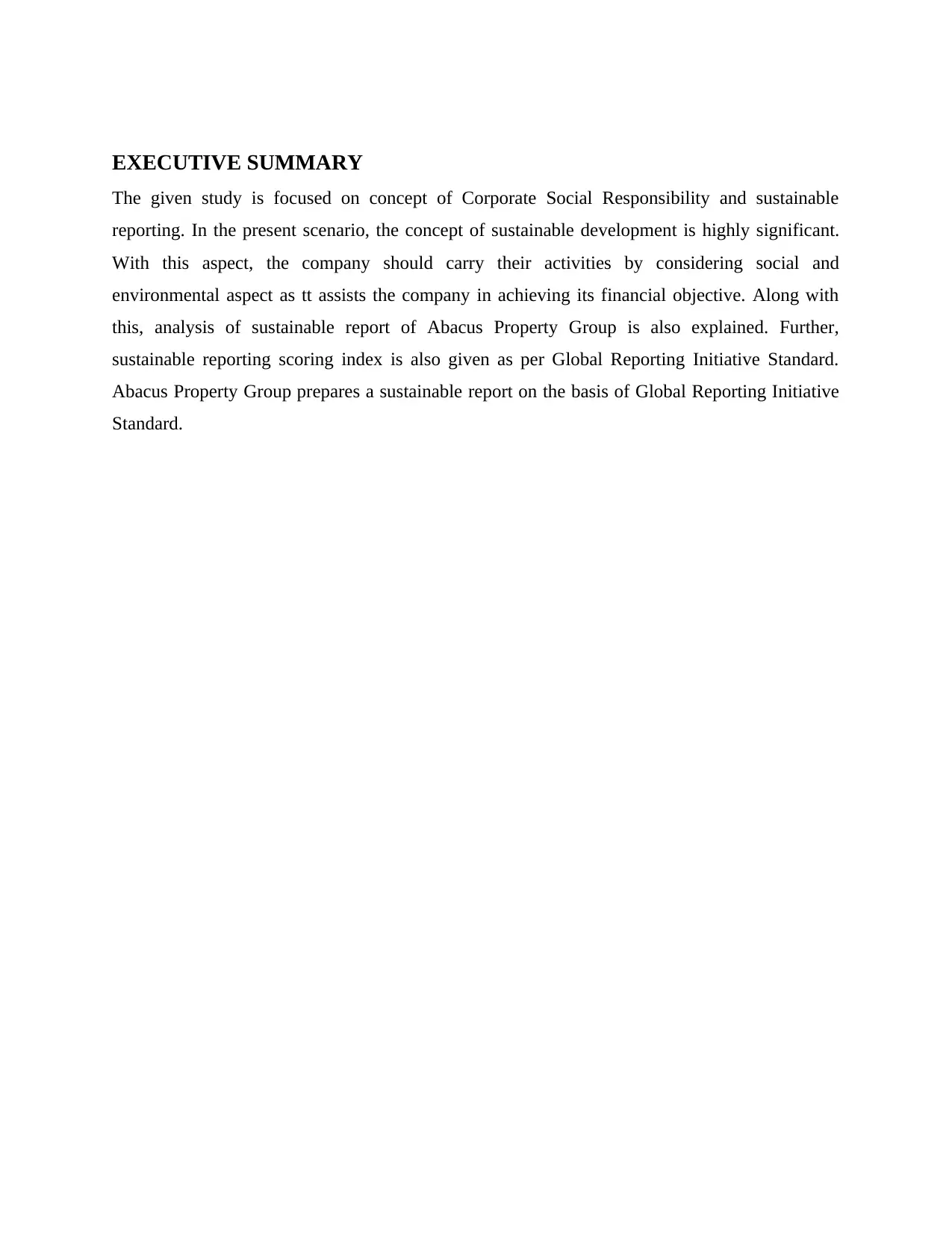
EXECUTIVE SUMMARY
The given study is focused on concept of Corporate Social Responsibility and sustainable
reporting. In the present scenario, the concept of sustainable development is highly significant.
With this aspect, the company should carry their activities by considering social and
environmental aspect as tt assists the company in achieving its financial objective. Along with
this, analysis of sustainable report of Abacus Property Group is also explained. Further,
sustainable reporting scoring index is also given as per Global Reporting Initiative Standard.
Abacus Property Group prepares a sustainable report on the basis of Global Reporting Initiative
Standard.
The given study is focused on concept of Corporate Social Responsibility and sustainable
reporting. In the present scenario, the concept of sustainable development is highly significant.
With this aspect, the company should carry their activities by considering social and
environmental aspect as tt assists the company in achieving its financial objective. Along with
this, analysis of sustainable report of Abacus Property Group is also explained. Further,
sustainable reporting scoring index is also given as per Global Reporting Initiative Standard.
Abacus Property Group prepares a sustainable report on the basis of Global Reporting Initiative
Standard.
⊘ This is a preview!⊘
Do you want full access?
Subscribe today to unlock all pages.

Trusted by 1+ million students worldwide
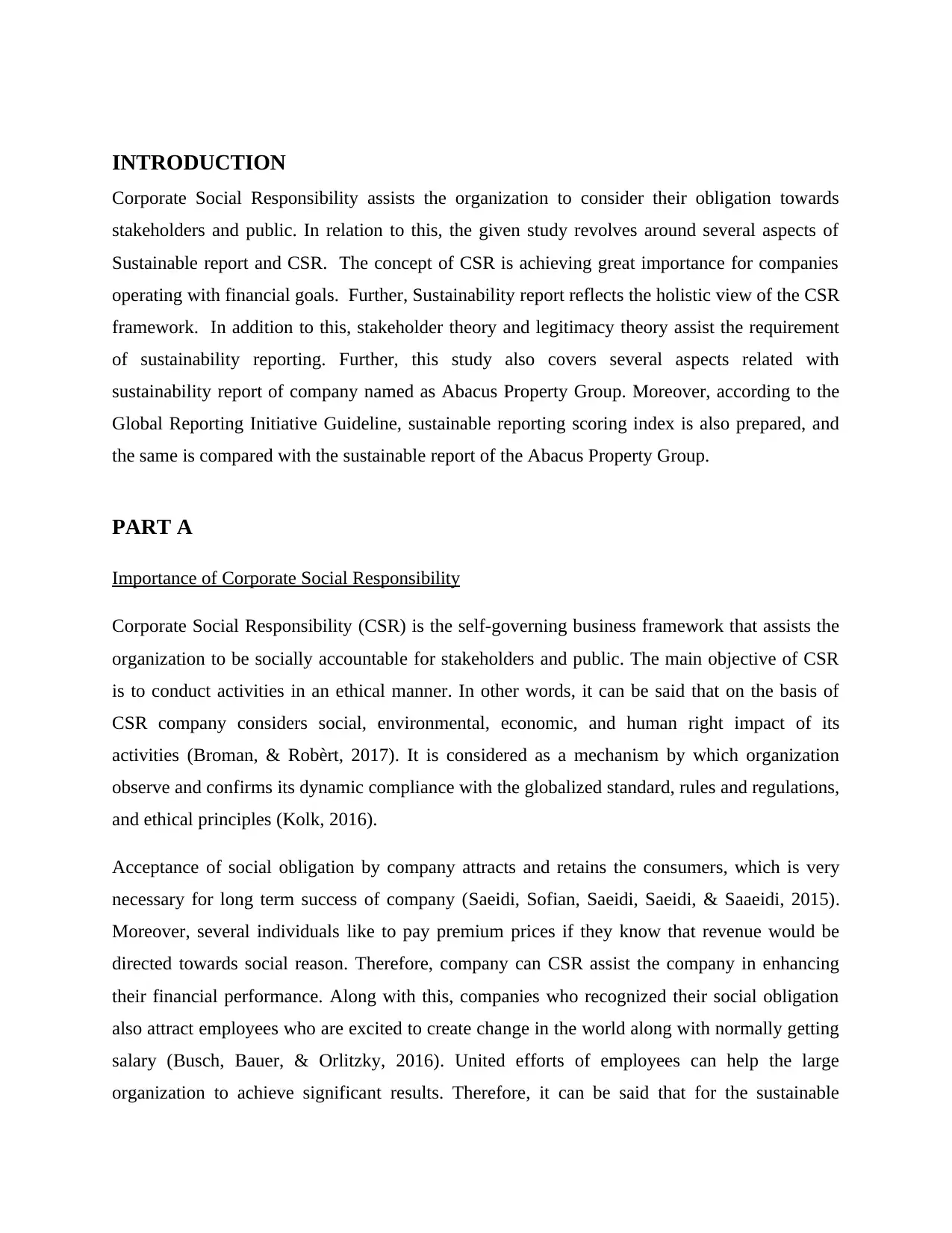
INTRODUCTION
Corporate Social Responsibility assists the organization to consider their obligation towards
stakeholders and public. In relation to this, the given study revolves around several aspects of
Sustainable report and CSR. The concept of CSR is achieving great importance for companies
operating with financial goals. Further, Sustainability report reflects the holistic view of the CSR
framework. In addition to this, stakeholder theory and legitimacy theory assist the requirement
of sustainability reporting. Further, this study also covers several aspects related with
sustainability report of company named as Abacus Property Group. Moreover, according to the
Global Reporting Initiative Guideline, sustainable reporting scoring index is also prepared, and
the same is compared with the sustainable report of the Abacus Property Group.
PART A
Importance of Corporate Social Responsibility
Corporate Social Responsibility (CSR) is the self-governing business framework that assists the
organization to be socially accountable for stakeholders and public. The main objective of CSR
is to conduct activities in an ethical manner. In other words, it can be said that on the basis of
CSR company considers social, environmental, economic, and human right impact of its
activities (Broman, & Robèrt, 2017). It is considered as a mechanism by which organization
observe and confirms its dynamic compliance with the globalized standard, rules and regulations,
and ethical principles (Kolk, 2016).
Acceptance of social obligation by company attracts and retains the consumers, which is very
necessary for long term success of company (Saeidi, Sofian, Saeidi, Saeidi, & Saaeidi, 2015).
Moreover, several individuals like to pay premium prices if they know that revenue would be
directed towards social reason. Therefore, company can CSR assist the company in enhancing
their financial performance. Along with this, companies who recognized their social obligation
also attract employees who are excited to create change in the world along with normally getting
salary (Busch, Bauer, & Orlitzky, 2016). United efforts of employees can help the large
organization to achieve significant results. Therefore, it can be said that for the sustainable
Corporate Social Responsibility assists the organization to consider their obligation towards
stakeholders and public. In relation to this, the given study revolves around several aspects of
Sustainable report and CSR. The concept of CSR is achieving great importance for companies
operating with financial goals. Further, Sustainability report reflects the holistic view of the CSR
framework. In addition to this, stakeholder theory and legitimacy theory assist the requirement
of sustainability reporting. Further, this study also covers several aspects related with
sustainability report of company named as Abacus Property Group. Moreover, according to the
Global Reporting Initiative Guideline, sustainable reporting scoring index is also prepared, and
the same is compared with the sustainable report of the Abacus Property Group.
PART A
Importance of Corporate Social Responsibility
Corporate Social Responsibility (CSR) is the self-governing business framework that assists the
organization to be socially accountable for stakeholders and public. The main objective of CSR
is to conduct activities in an ethical manner. In other words, it can be said that on the basis of
CSR company considers social, environmental, economic, and human right impact of its
activities (Broman, & Robèrt, 2017). It is considered as a mechanism by which organization
observe and confirms its dynamic compliance with the globalized standard, rules and regulations,
and ethical principles (Kolk, 2016).
Acceptance of social obligation by company attracts and retains the consumers, which is very
necessary for long term success of company (Saeidi, Sofian, Saeidi, Saeidi, & Saaeidi, 2015).
Moreover, several individuals like to pay premium prices if they know that revenue would be
directed towards social reason. Therefore, company can CSR assist the company in enhancing
their financial performance. Along with this, companies who recognized their social obligation
also attract employees who are excited to create change in the world along with normally getting
salary (Busch, Bauer, & Orlitzky, 2016). United efforts of employees can help the large
organization to achieve significant results. Therefore, it can be said that for the sustainable
Paraphrase This Document
Need a fresh take? Get an instant paraphrase of this document with our AI Paraphraser
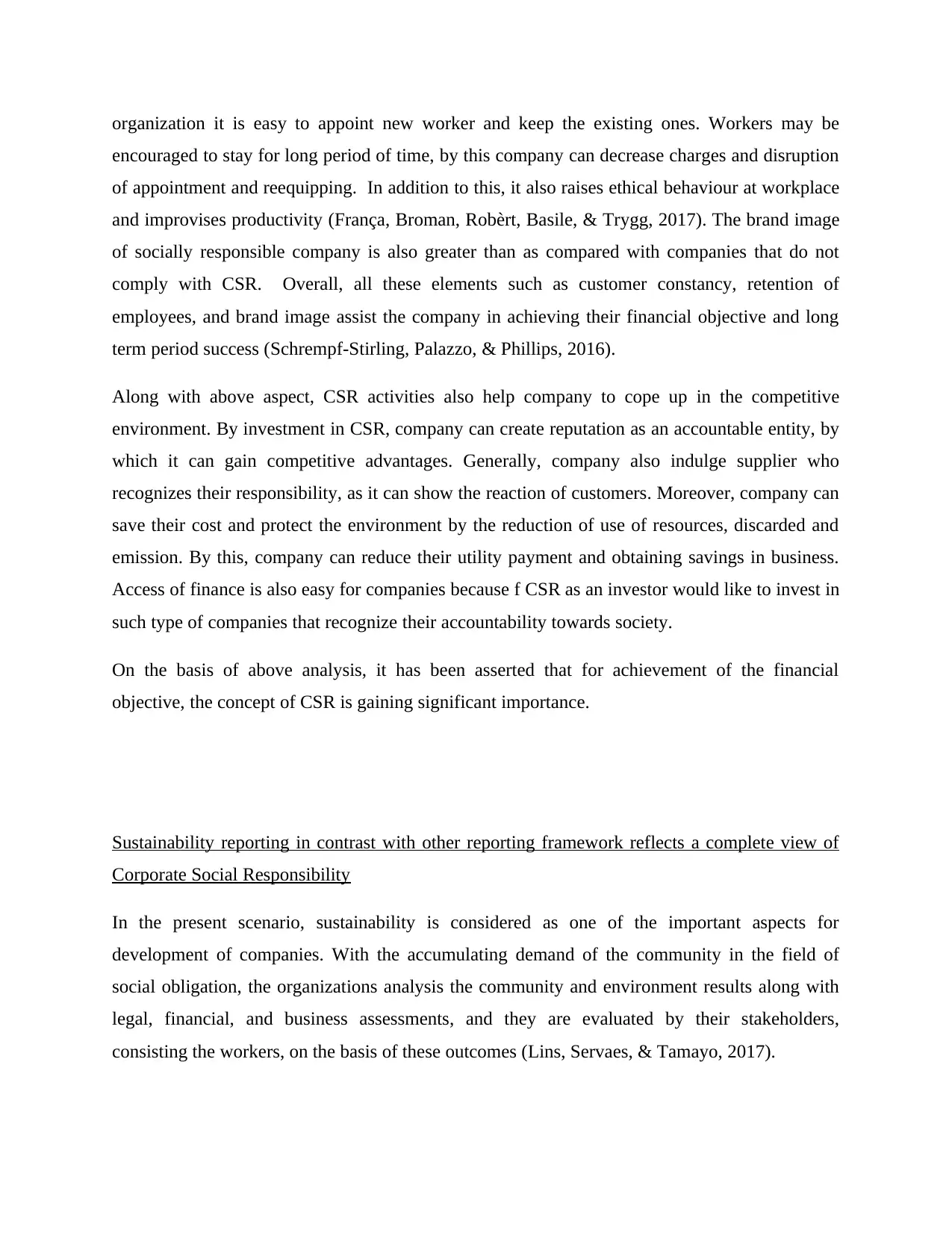
organization it is easy to appoint new worker and keep the existing ones. Workers may be
encouraged to stay for long period of time, by this company can decrease charges and disruption
of appointment and reequipping. In addition to this, it also raises ethical behaviour at workplace
and improvises productivity (França, Broman, Robèrt, Basile, & Trygg, 2017). The brand image
of socially responsible company is also greater than as compared with companies that do not
comply with CSR. Overall, all these elements such as customer constancy, retention of
employees, and brand image assist the company in achieving their financial objective and long
term period success (Schrempf-Stirling, Palazzo, & Phillips, 2016).
Along with above aspect, CSR activities also help company to cope up in the competitive
environment. By investment in CSR, company can create reputation as an accountable entity, by
which it can gain competitive advantages. Generally, company also indulge supplier who
recognizes their responsibility, as it can show the reaction of customers. Moreover, company can
save their cost and protect the environment by the reduction of use of resources, discarded and
emission. By this, company can reduce their utility payment and obtaining savings in business.
Access of finance is also easy for companies because f CSR as an investor would like to invest in
such type of companies that recognize their accountability towards society.
On the basis of above analysis, it has been asserted that for achievement of the financial
objective, the concept of CSR is gaining significant importance.
Sustainability reporting in contrast with other reporting framework reflects a complete view of
Corporate Social Responsibility
In the present scenario, sustainability is considered as one of the important aspects for
development of companies. With the accumulating demand of the community in the field of
social obligation, the organizations analysis the community and environment results along with
legal, financial, and business assessments, and they are evaluated by their stakeholders,
consisting the workers, on the basis of these outcomes (Lins, Servaes, & Tamayo, 2017).
encouraged to stay for long period of time, by this company can decrease charges and disruption
of appointment and reequipping. In addition to this, it also raises ethical behaviour at workplace
and improvises productivity (França, Broman, Robèrt, Basile, & Trygg, 2017). The brand image
of socially responsible company is also greater than as compared with companies that do not
comply with CSR. Overall, all these elements such as customer constancy, retention of
employees, and brand image assist the company in achieving their financial objective and long
term period success (Schrempf-Stirling, Palazzo, & Phillips, 2016).
Along with above aspect, CSR activities also help company to cope up in the competitive
environment. By investment in CSR, company can create reputation as an accountable entity, by
which it can gain competitive advantages. Generally, company also indulge supplier who
recognizes their responsibility, as it can show the reaction of customers. Moreover, company can
save their cost and protect the environment by the reduction of use of resources, discarded and
emission. By this, company can reduce their utility payment and obtaining savings in business.
Access of finance is also easy for companies because f CSR as an investor would like to invest in
such type of companies that recognize their accountability towards society.
On the basis of above analysis, it has been asserted that for achievement of the financial
objective, the concept of CSR is gaining significant importance.
Sustainability reporting in contrast with other reporting framework reflects a complete view of
Corporate Social Responsibility
In the present scenario, sustainability is considered as one of the important aspects for
development of companies. With the accumulating demand of the community in the field of
social obligation, the organizations analysis the community and environment results along with
legal, financial, and business assessments, and they are evaluated by their stakeholders,
consisting the workers, on the basis of these outcomes (Lins, Servaes, & Tamayo, 2017).
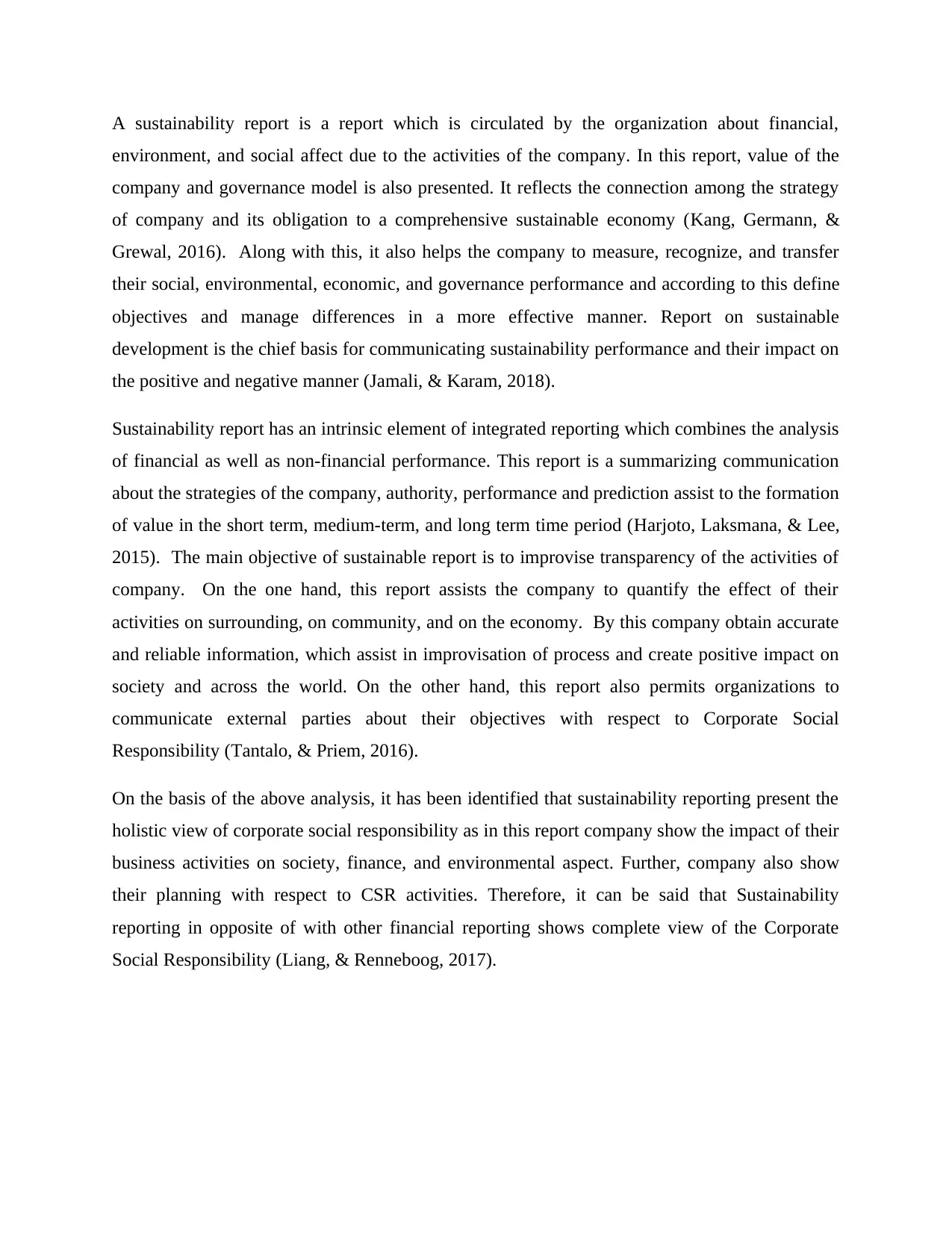
A sustainability report is a report which is circulated by the organization about financial,
environment, and social affect due to the activities of the company. In this report, value of the
company and governance model is also presented. It reflects the connection among the strategy
of company and its obligation to a comprehensive sustainable economy (Kang, Germann, &
Grewal, 2016). Along with this, it also helps the company to measure, recognize, and transfer
their social, environmental, economic, and governance performance and according to this define
objectives and manage differences in a more effective manner. Report on sustainable
development is the chief basis for communicating sustainability performance and their impact on
the positive and negative manner (Jamali, & Karam, 2018).
Sustainability report has an intrinsic element of integrated reporting which combines the analysis
of financial as well as non-financial performance. This report is a summarizing communication
about the strategies of the company, authority, performance and prediction assist to the formation
of value in the short term, medium-term, and long term time period (Harjoto, Laksmana, & Lee,
2015). The main objective of sustainable report is to improvise transparency of the activities of
company. On the one hand, this report assists the company to quantify the effect of their
activities on surrounding, on community, and on the economy. By this company obtain accurate
and reliable information, which assist in improvisation of process and create positive impact on
society and across the world. On the other hand, this report also permits organizations to
communicate external parties about their objectives with respect to Corporate Social
Responsibility (Tantalo, & Priem, 2016).
On the basis of the above analysis, it has been identified that sustainability reporting present the
holistic view of corporate social responsibility as in this report company show the impact of their
business activities on society, finance, and environmental aspect. Further, company also show
their planning with respect to CSR activities. Therefore, it can be said that Sustainability
reporting in opposite of with other financial reporting shows complete view of the Corporate
Social Responsibility (Liang, & Renneboog, 2017).
environment, and social affect due to the activities of the company. In this report, value of the
company and governance model is also presented. It reflects the connection among the strategy
of company and its obligation to a comprehensive sustainable economy (Kang, Germann, &
Grewal, 2016). Along with this, it also helps the company to measure, recognize, and transfer
their social, environmental, economic, and governance performance and according to this define
objectives and manage differences in a more effective manner. Report on sustainable
development is the chief basis for communicating sustainability performance and their impact on
the positive and negative manner (Jamali, & Karam, 2018).
Sustainability report has an intrinsic element of integrated reporting which combines the analysis
of financial as well as non-financial performance. This report is a summarizing communication
about the strategies of the company, authority, performance and prediction assist to the formation
of value in the short term, medium-term, and long term time period (Harjoto, Laksmana, & Lee,
2015). The main objective of sustainable report is to improvise transparency of the activities of
company. On the one hand, this report assists the company to quantify the effect of their
activities on surrounding, on community, and on the economy. By this company obtain accurate
and reliable information, which assist in improvisation of process and create positive impact on
society and across the world. On the other hand, this report also permits organizations to
communicate external parties about their objectives with respect to Corporate Social
Responsibility (Tantalo, & Priem, 2016).
On the basis of the above analysis, it has been identified that sustainability reporting present the
holistic view of corporate social responsibility as in this report company show the impact of their
business activities on society, finance, and environmental aspect. Further, company also show
their planning with respect to CSR activities. Therefore, it can be said that Sustainability
reporting in opposite of with other financial reporting shows complete view of the Corporate
Social Responsibility (Liang, & Renneboog, 2017).
⊘ This is a preview!⊘
Do you want full access?
Subscribe today to unlock all pages.

Trusted by 1+ million students worldwide
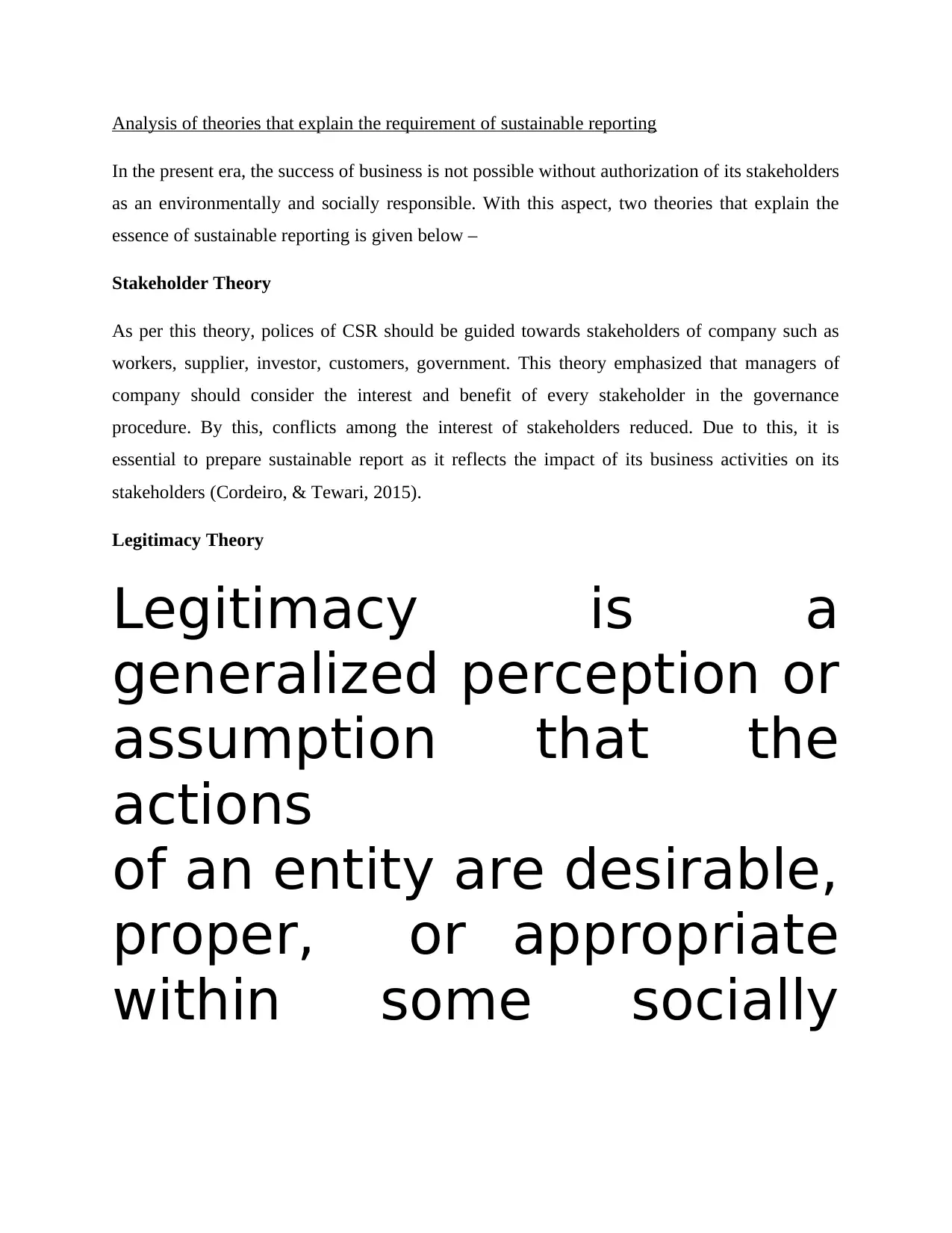
Analysis of theories that explain the requirement of sustainable reporting
In the present era, the success of business is not possible without authorization of its stakeholders
as an environmentally and socially responsible. With this aspect, two theories that explain the
essence of sustainable reporting is given below –
Stakeholder Theory
As per this theory, polices of CSR should be guided towards stakeholders of company such as
workers, supplier, investor, customers, government. This theory emphasized that managers of
company should consider the interest and benefit of every stakeholder in the governance
procedure. By this, conflicts among the interest of stakeholders reduced. Due to this, it is
essential to prepare sustainable report as it reflects the impact of its business activities on its
stakeholders (Cordeiro, & Tewari, 2015).
Legitimacy Theory
Legitimacy is a
generalized perception or
assumption that the
actions
of an entity are desirable,
proper, or appropriate
within some socially
In the present era, the success of business is not possible without authorization of its stakeholders
as an environmentally and socially responsible. With this aspect, two theories that explain the
essence of sustainable reporting is given below –
Stakeholder Theory
As per this theory, polices of CSR should be guided towards stakeholders of company such as
workers, supplier, investor, customers, government. This theory emphasized that managers of
company should consider the interest and benefit of every stakeholder in the governance
procedure. By this, conflicts among the interest of stakeholders reduced. Due to this, it is
essential to prepare sustainable report as it reflects the impact of its business activities on its
stakeholders (Cordeiro, & Tewari, 2015).
Legitimacy Theory
Legitimacy is a
generalized perception or
assumption that the
actions
of an entity are desirable,
proper, or appropriate
within some socially
Paraphrase This Document
Need a fresh take? Get an instant paraphrase of this document with our AI Paraphraser
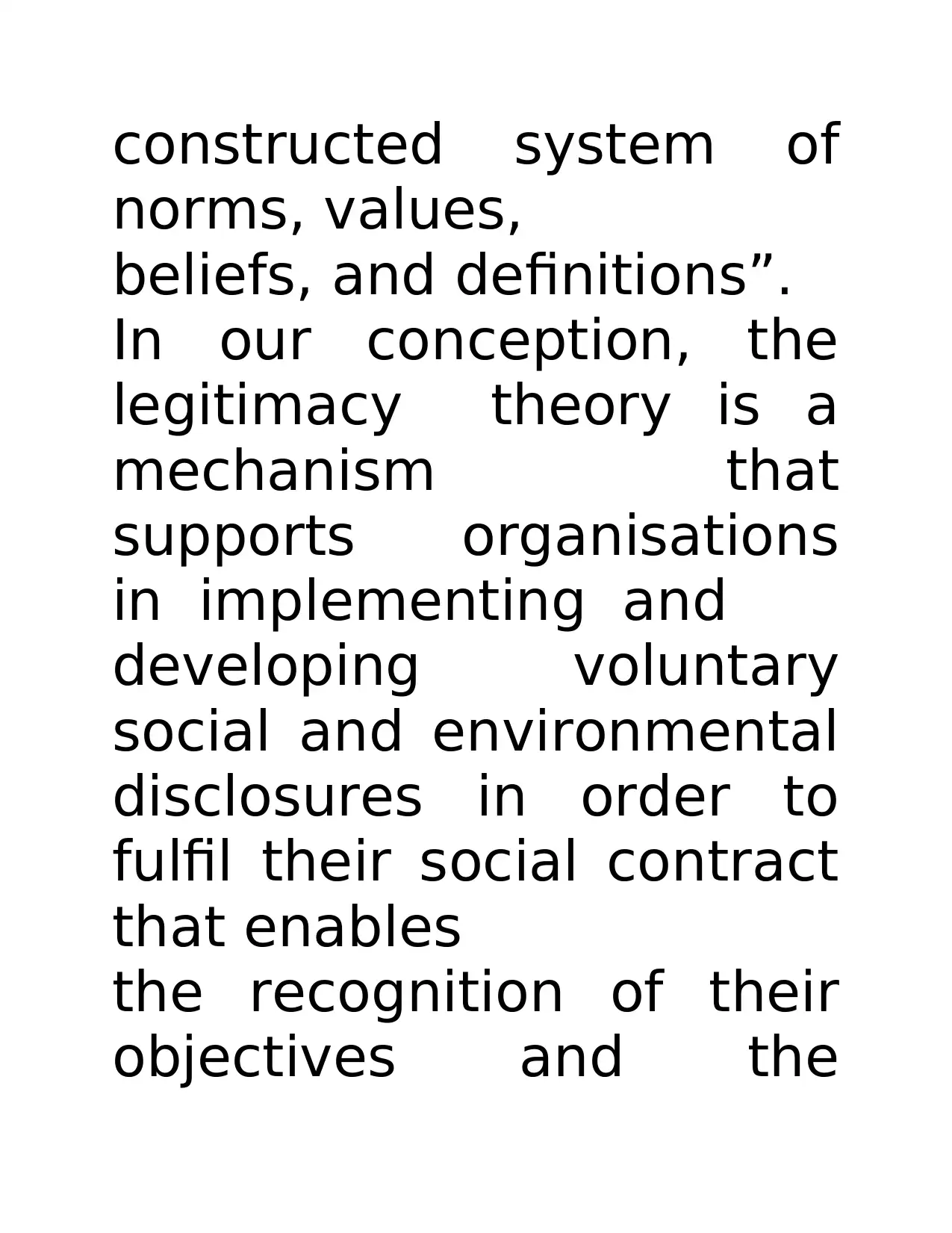
constructed system of
norms, values,
beliefs, and definitions”.
In our conception, the
legitimacy theory is a
mechanism that
supports organisations
in implementing and
developing voluntary
social and environmental
disclosures in order to
fulfil their social contract
that enables
the recognition of their
objectives and the
norms, values,
beliefs, and definitions”.
In our conception, the
legitimacy theory is a
mechanism that
supports organisations
in implementing and
developing voluntary
social and environmental
disclosures in order to
fulfil their social contract
that enables
the recognition of their
objectives and the
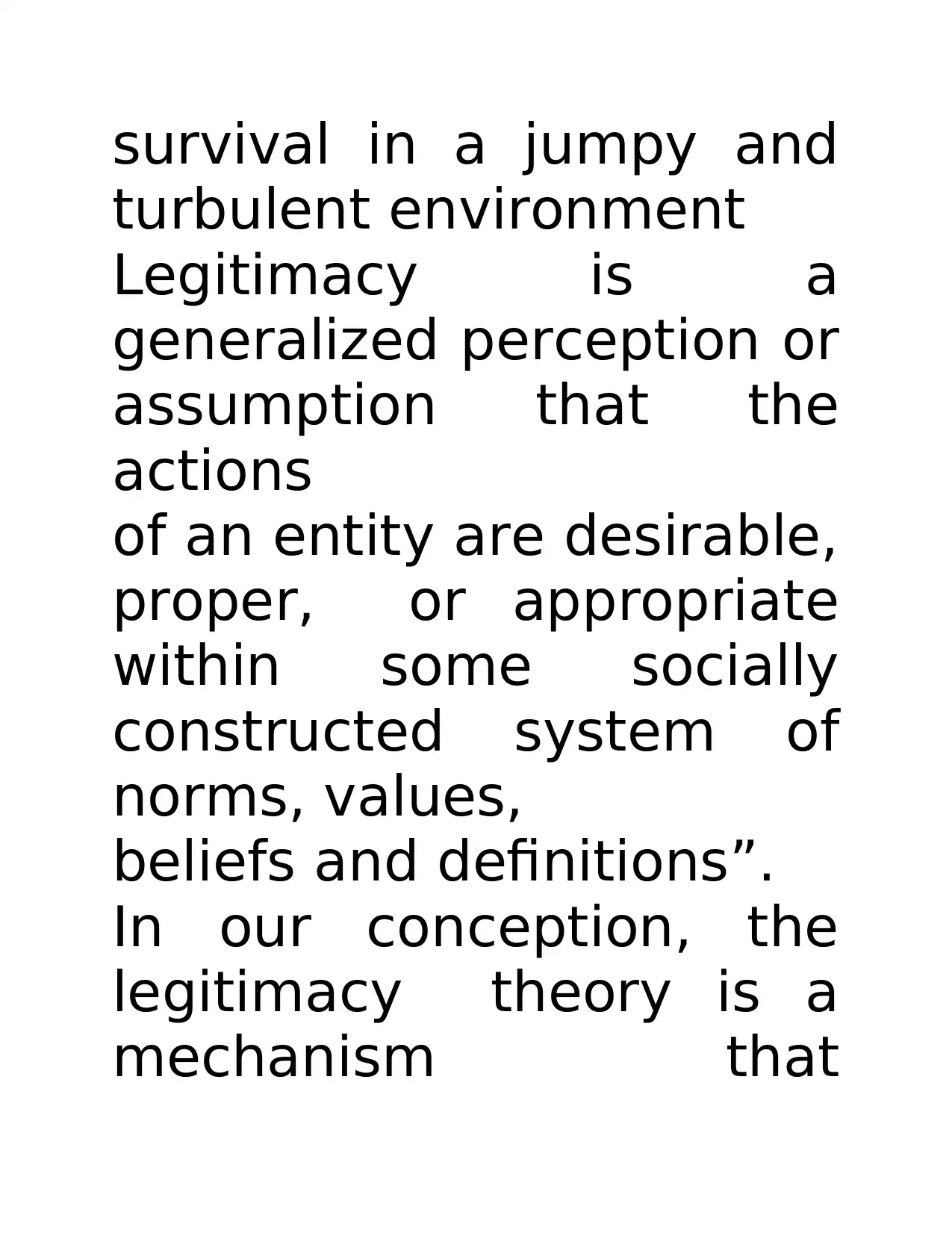
survival in a jumpy and
turbulent environment
Legitimacy is a
generalized perception or
assumption that the
actions
of an entity are desirable,
proper, or appropriate
within some socially
constructed system of
norms, values,
beliefs and definitions”.
In our conception, the
legitimacy theory is a
mechanism that
turbulent environment
Legitimacy is a
generalized perception or
assumption that the
actions
of an entity are desirable,
proper, or appropriate
within some socially
constructed system of
norms, values,
beliefs and definitions”.
In our conception, the
legitimacy theory is a
mechanism that
⊘ This is a preview!⊘
Do you want full access?
Subscribe today to unlock all pages.

Trusted by 1+ million students worldwide
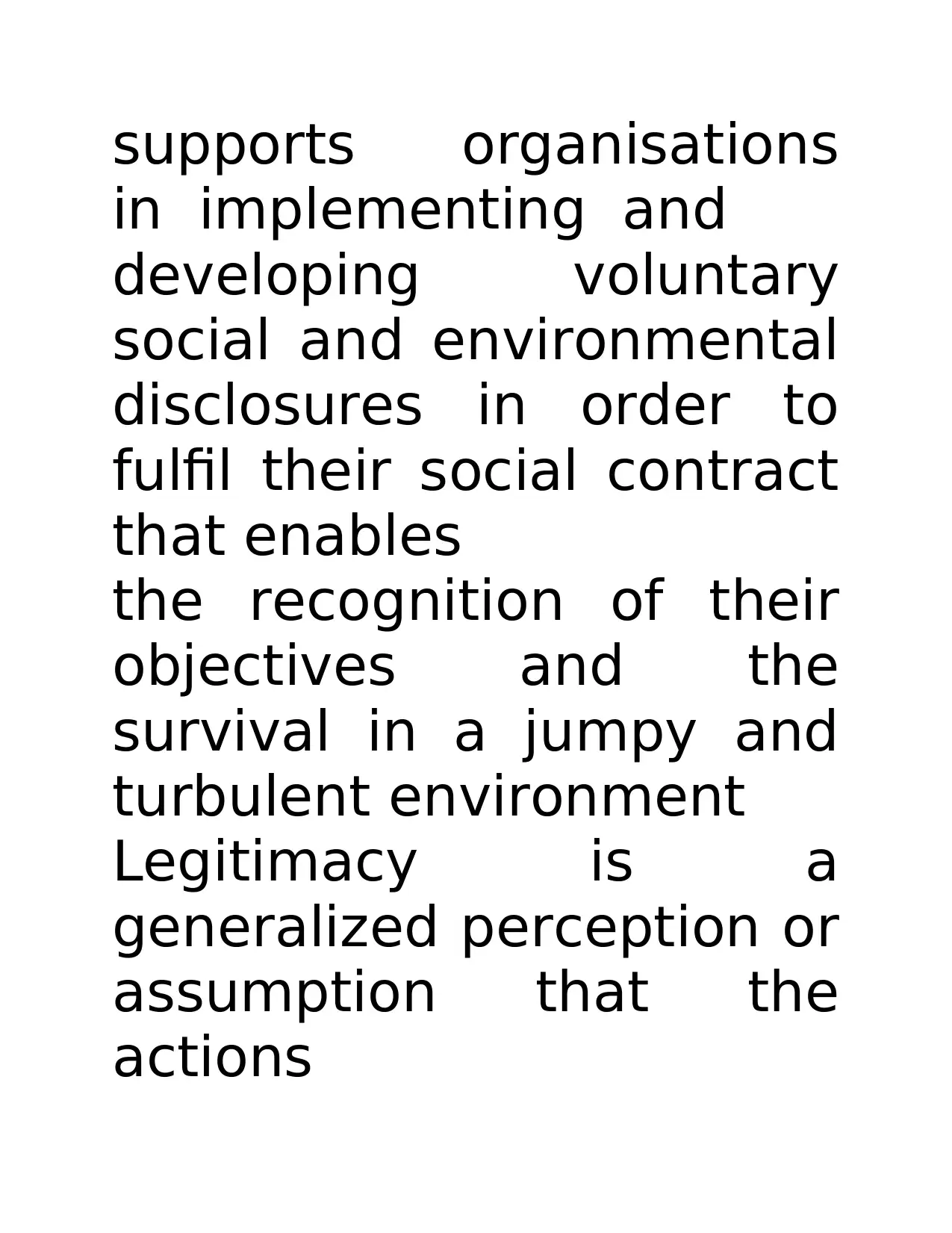
supports organisations
in implementing and
developing voluntary
social and environmental
disclosures in order to
fulfil their social contract
that enables
the recognition of their
objectives and the
survival in a jumpy and
turbulent environment
Legitimacy is a
generalized perception or
assumption that the
actions
in implementing and
developing voluntary
social and environmental
disclosures in order to
fulfil their social contract
that enables
the recognition of their
objectives and the
survival in a jumpy and
turbulent environment
Legitimacy is a
generalized perception or
assumption that the
actions
Paraphrase This Document
Need a fresh take? Get an instant paraphrase of this document with our AI Paraphraser
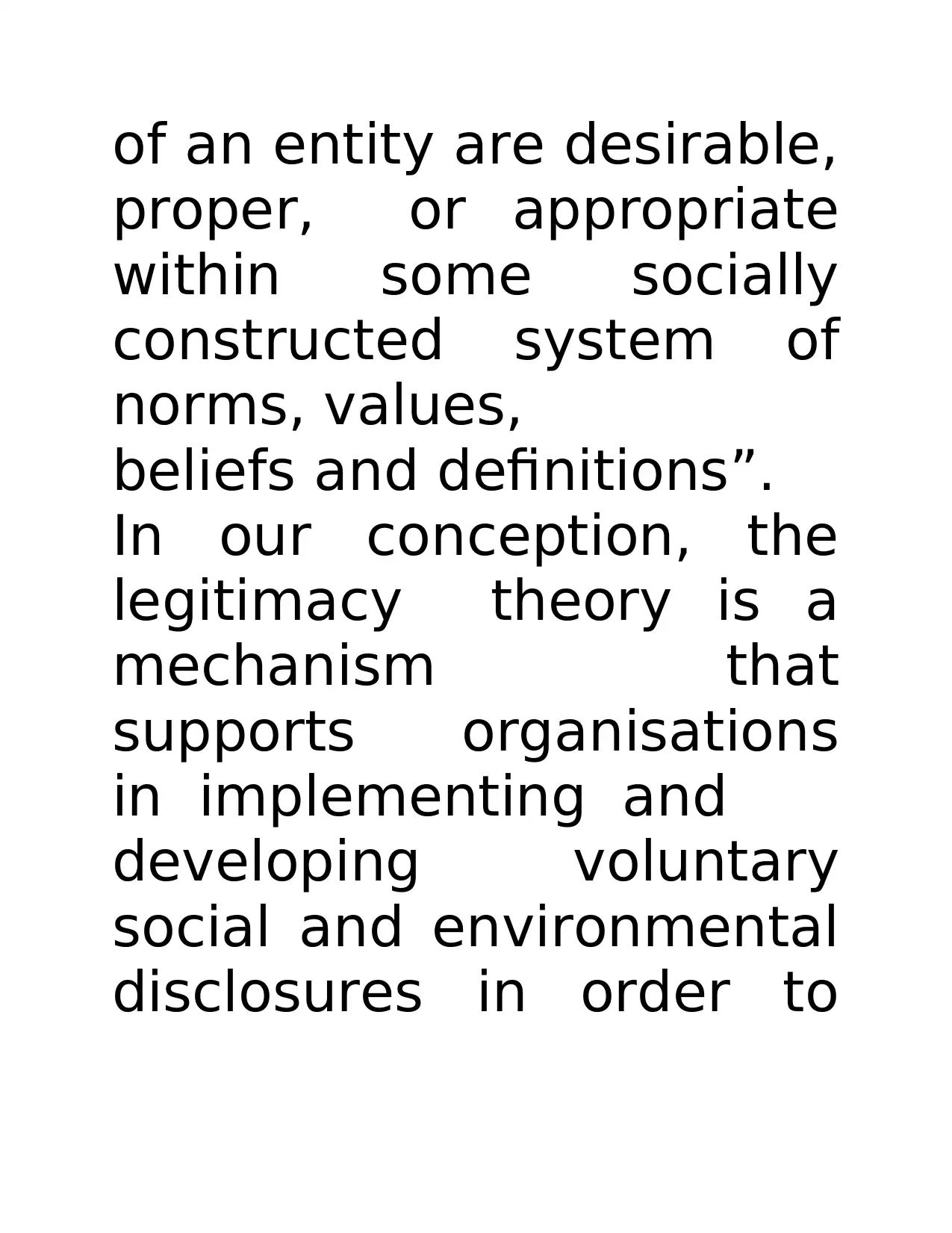
of an entity are desirable,
proper, or appropriate
within some socially
constructed system of
norms, values,
beliefs and definitions”.
In our conception, the
legitimacy theory is a
mechanism that
supports organisations
in implementing and
developing voluntary
social and environmental
disclosures in order to
proper, or appropriate
within some socially
constructed system of
norms, values,
beliefs and definitions”.
In our conception, the
legitimacy theory is a
mechanism that
supports organisations
in implementing and
developing voluntary
social and environmental
disclosures in order to
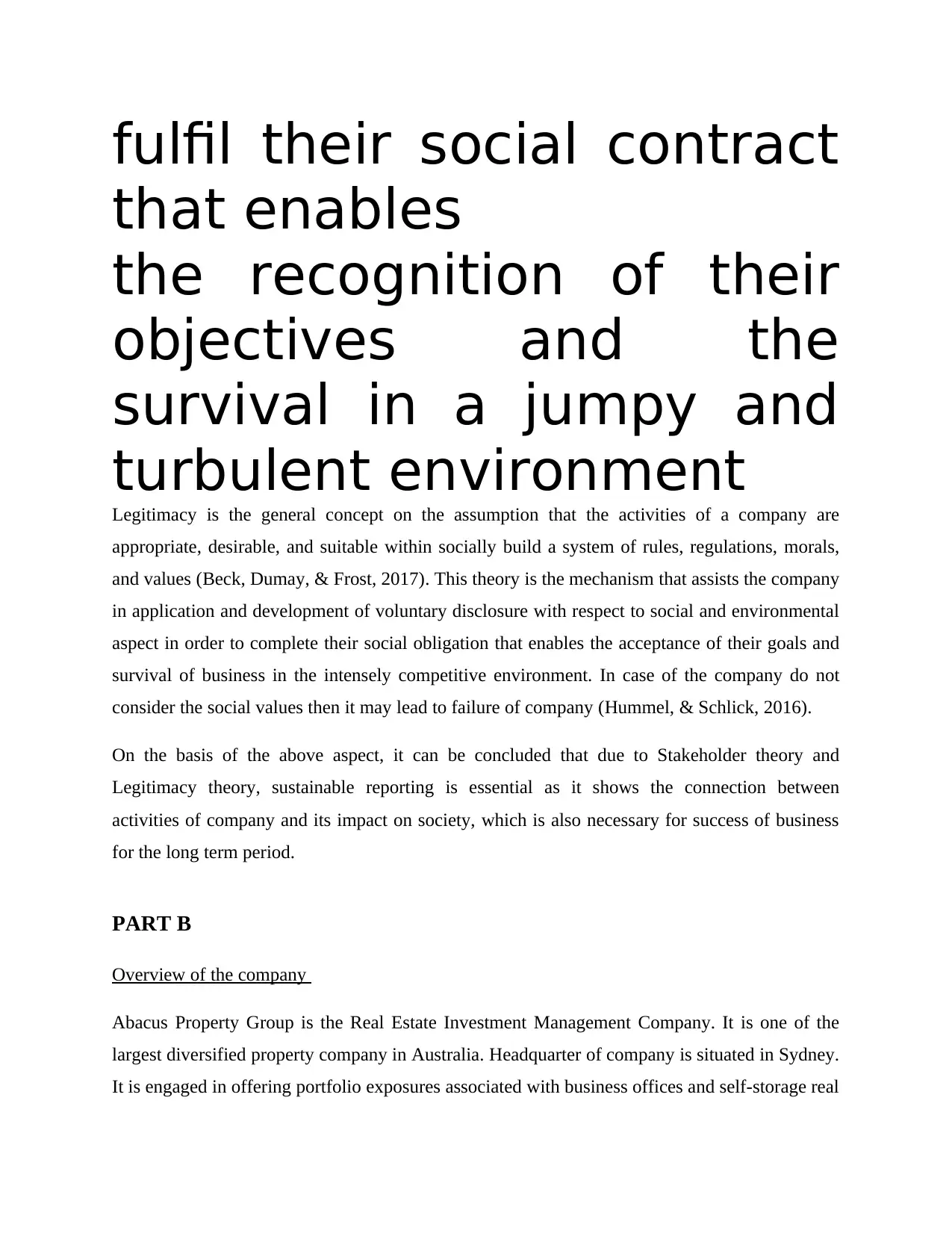
fulfil their social contract
that enables
the recognition of their
objectives and the
survival in a jumpy and
turbulent environment
Legitimacy is the general concept on the assumption that the activities of a company are
appropriate, desirable, and suitable within socially build a system of rules, regulations, morals,
and values (Beck, Dumay, & Frost, 2017). This theory is the mechanism that assists the company
in application and development of voluntary disclosure with respect to social and environmental
aspect in order to complete their social obligation that enables the acceptance of their goals and
survival of business in the intensely competitive environment. In case of the company do not
consider the social values then it may lead to failure of company (Hummel, & Schlick, 2016).
On the basis of the above aspect, it can be concluded that due to Stakeholder theory and
Legitimacy theory, sustainable reporting is essential as it shows the connection between
activities of company and its impact on society, which is also necessary for success of business
for the long term period.
PART B
Overview of the company
Abacus Property Group is the Real Estate Investment Management Company. It is one of the
largest diversified property company in Australia. Headquarter of company is situated in Sydney.
It is engaged in offering portfolio exposures associated with business offices and self-storage real
that enables
the recognition of their
objectives and the
survival in a jumpy and
turbulent environment
Legitimacy is the general concept on the assumption that the activities of a company are
appropriate, desirable, and suitable within socially build a system of rules, regulations, morals,
and values (Beck, Dumay, & Frost, 2017). This theory is the mechanism that assists the company
in application and development of voluntary disclosure with respect to social and environmental
aspect in order to complete their social obligation that enables the acceptance of their goals and
survival of business in the intensely competitive environment. In case of the company do not
consider the social values then it may lead to failure of company (Hummel, & Schlick, 2016).
On the basis of the above aspect, it can be concluded that due to Stakeholder theory and
Legitimacy theory, sustainable reporting is essential as it shows the connection between
activities of company and its impact on society, which is also necessary for success of business
for the long term period.
PART B
Overview of the company
Abacus Property Group is the Real Estate Investment Management Company. It is one of the
largest diversified property company in Australia. Headquarter of company is situated in Sydney.
It is engaged in offering portfolio exposures associated with business offices and self-storage real
⊘ This is a preview!⊘
Do you want full access?
Subscribe today to unlock all pages.

Trusted by 1+ million students worldwide
1 out of 20
Related Documents
Your All-in-One AI-Powered Toolkit for Academic Success.
+13062052269
info@desklib.com
Available 24*7 on WhatsApp / Email
![[object Object]](/_next/static/media/star-bottom.7253800d.svg)
Unlock your academic potential
Copyright © 2020–2026 A2Z Services. All Rights Reserved. Developed and managed by ZUCOL.





